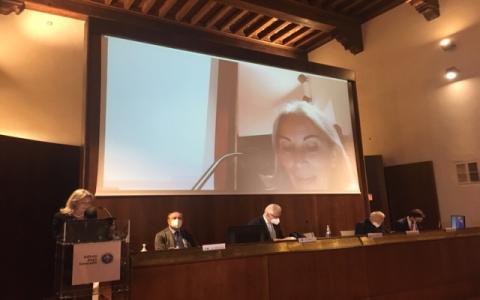
The national conference entitled Educazione Zerosei, took place on 18 January at the Istituto degli Innocenti in Florence. Rights, quality and accessibility in the integrated system, organised by the historic Florentine institution with the partnership with the Regional School Office for Tuscany.
The conference, also attended by Education Minister Patrizio Bianchi, was an important opportunity to start reflecting on the integrated 0-6 system, not only focusing on the critical issues that still characterise it (such as requests for day nurseries exceeding supply and empty places in pre-schools), but also offering important ideas for outlining useful working perspectives for a concrete implementation of its reform, launched in 2015. Perspectives that centre around a number of guidelines: among these, the guarantee of equal and generalised accessibility, through the radical elimination of the concept of a service on individual demand, in keeping with the path already undertaken for pre-schools; the harmonisation and integration of basic and in-service training courses for teachers, to provide concrete support for continuity courses throughout the 0-6 year course; the updating of organisational and functional standards and requirements and the necessary public-private integration.
Besides the president of the Istituto degli Innocenti, Maria Grazia Giuffrida, the following spoke at the conference: Eugenio Giani, president of Tuscany Region; Dario Nardella, mayor of Florence; Alessandra Nardini, councillor for education, vocational training, university and research, employment, international relations and gender policies of the Tuscany Region; Ernesto Pellecchia, director of the Regional School Office for Tuscany; Carla Garlatti, Supervisory Authority for Children and Adolescents, who took part in the event with a video message.
The round table that took place in the second part of the morning, focused on the theme of the system's governance and the necessary levels of integration and coordination between the various institutional figures called upon to guarantee it, was attended by Gianluca Lombardo, director of Office II Directorate for School Regulations of the Ministry of Education, Ilaria Antonini, head of the Department for Family Policies of the Presidency of the Council of Ministers, and Antonio Mazzarotto, director of the Family, Children and Vulnerable Persons Area of the Lazio Region.
During the event, the data of the latest annual monitoring that has been carried out for over ten years by the Istituto degli Innocenti to measure the quality and accessibility of the supply of nurseries in the country were presented, reported in the in the first volume of the new publishing series of the Institute Infanzia e Adolescenza agli Innocenti, entitled Educazione Zerosei. Rights, quality and accessibility in the integrated system, explained during the event.
According to the results of the study, carried out with a growing number of regions representing 2/5 of the 0-6 population, in Italy, nurseries are currently still at 23% coverage (the European Union target is 33%) with regional differences: in Tuscany, one child in 3 attends a nursery school, the Italian average is one in 4, but in some areas of the South it is less than one child in 10. The nurseries – which are still fee-paying, including municipal or contracted nurseries - are few in relation to demand. Nevertheless, giving up a place at a nursery school after securing it, dropping out after starting to attend (perhaps in order to transfer the child to a nursery school as a free-access pre-schooler), and irregular payment of fees are phenomena that affect more than 20% of the children who have secured a place in a municipal or affiliated facility. The situation deteriorated with the pandemic: dropouts affected 16% of children, resignations 9% and irregular payment of fees 14.5%. A useful approach to overcoming these critical issues is the progressive reduction of fees for access to educational services for the youngest children, as has happened in the case of most pre-schools.
Other data reveals that there are more than 22,500 pre-schools in almost 6,700 Italian municipalities; because of decreasing birth rates, they have lost more than 5,000 classes and more than 265,000 enrolled children in a decade, while the average number of children per class has decreased from 23 to 21. In order to overcome this disparity, it would be useful to organise spring nurseries instead of pre-schools and micro-nurseries or nurseries in the pre-school classes that are no longer needed for older children, to aim at progressively integrating the two systems 0-3 and 3-6, while also strengthening integration between the public and private sectors, in order to improve accessibility to the service.
The Educazione Zerosei publication. Entitlements, quality and accessibility in the integrated system presents general contributions, data analyses, reflections and ideas on possible strategies to strengthen and develop the provision, as well as gathering the rich repertoire of experiences of the Italian municipalities involved in the survey.
Other materials and information are available on this site under the topic Integrated system 0-6, which can be reached from the "Topics" navigation menu.

